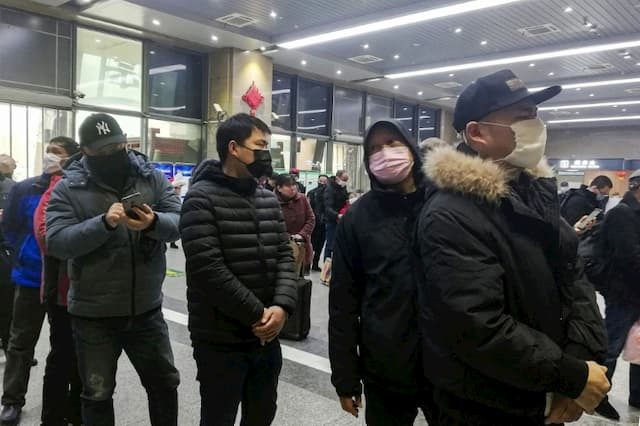Virus in China: Wuhan, at the Heart of the Mysterious Epidemic, Quarantine

The Chinese authorities decided on Thursday 23rd January 2020 to place in quarantine the metropolis of Wuhan, in the centre of the country, from which the epidemic started which left 17 dead.
China is taking great measures against the new coronavirus which has started to spread to the rest of the world, de facto quarantining as of Thursday, 23rd January 2020 the metropolis of Wuhan, at the heart of the epidemic.
Since 10am local time, no more trains or planes should in principle leave the city of 11 million inhabitants located in the centre of China.
The city on the banks of the Yangtze is at the heart of the epidemic which since December has infected more than 500 people and left 17 dead, according to the last report released on Wednesday evening. All those who died in Wuhan or its region.
“The inhabitants must not leave Wuhan without a specific reason,” announced the headquarters responsible for combating the epidemic at the municipal level.
This decision is made to “effectively stop the spread of the virus,” he said, as China prepares to enter its long New Year’s holiday on Friday, which causes hundreds of millions of people each year. trips.
The decision having been announced overnight, the inhabitants of Wuhan could not plan a possible departure.
In the early morning, it was still possible to leave the city by car, according to a reporter for the information website The Paper.
Gas stations in the harbour
At the motorway exits of the city, the police stopped certain vehicles in order to take the body temperature of the occupants, according to this source.
Queues formed in front of some gas stations, while many others ran out of fuel.
It was still possible to reach the city by train or plane, even if many flights were cancelled. But inside Wuhan, public transportation was stopped and the New Year’s festivities were cancelled.
The town hall also imposed the wearing of a respiratory mask, which most of the inhabitants had, in any case, started to wear since the beginning of the week.
The fight began when a Chinese scientist admitted that the virus could be transmitted from human to human and not just from animal to human.
Read also: Virus in China: transmission between humans confirmed, other countries affected
President Xi Jinping gave the signal for mobilization on Monday by calling for a “resolute” check on the epidemic, which until then had not made the headlines.
In Beijing as in Shanghai, the wearing of the mask was used in public places, like the subway.

“Very very strong” measures welcomed by WHO
In Geneva, the director of the World Health Organization ( WHO ), Tedros Adhanom Ghebreyesus, welcomed the “very, very strong” measures taken by China, saying that they would “reduce” the risks of spread outside of its borders.
They intervened when WHO had assembled its emergency committee to decide whether the new virus constituted a “public health emergency of international concern”.
The experts not having been able to agree on the question, the director of the WHO decided to continue the meeting Thursday from 11 am.
WHO has so far used the term international emergency only for rare cases of epidemics requiring a vigorous global response, including H1N1 swine flu in 2009, Zika virus in 2016 and Ebola fever, which has ravaged part of West Africa from 2014 to 2016 and the DRC since 2018.
In Washington, a spokesman for the State Department pointed out “encouraging signs that the Chinese government has understood the seriousness of this problem”.
The SARS family virus has spread to several countries in Asia and even the United States, where a few cases have been reported.
Body temperature controls have become widespread at several airports in Asia, the Pacific Rim as well as in the United Kingdom, Nigeria and Italy.
Illegal trade
The virus was spotted at a wholesale seafood market in Wuhan. Its exact origin is not yet known, but its incubation period is said to be around 14 days.
Illegal sales of wild animals took place in this market, recognized the National Center for Disease Control and Prevention, without being able to say with certainty if the game was at the origin of the epidemic.
The strain is a new type of coronavirus, a family with a large number of viruses. They can cause mild illnesses in humans (like a cold) but also other more serious ones like SARS.
The WHO had at the time of SARS, in 2002-2003, strongly criticized Beijing for having delayed raising the alarm and trying to conceal the extent of the epidemic.
Enjoyed this? Get the week’s top France stories
One email every Sunday. Unsubscribe anytime.


